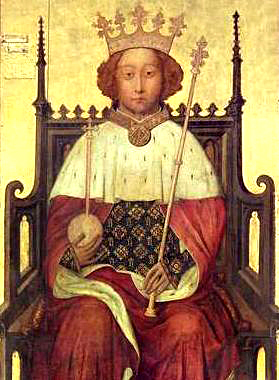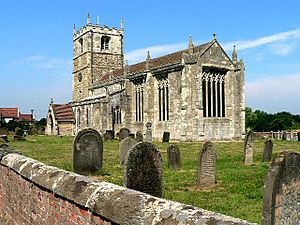William de Skipwith facts for kids
William de Skipwith was an important English judge who lived a long time ago, in the 1300s. He also worked as a judge in Ireland. He was even the main judge in charge of the King's money matters, called the Chief Baron of the Exchequer, from 1362 to 1365.
William de Skipwith faced some trouble when he was removed from his job for doing things that were not fair. But he got back into the King's good graces! He became the top judge in Ireland, known as the Lord Chief Justice of Ireland, from 1370 to 1372. Later, he returned to work as a judge in England. He was special because he was the only top judge who managed to avoid being put on trial by the English Parliament of 1388.
Contents
Skipwith's Family Background
William de Skipwith was the younger son of William de Skipwith and Margaret Fitzsimon. His family came from a place called Skipwith in North Yorkshire. They were related to Robert de Stuteville, who was the lord of the land there during the time of King Henry III. His mother's family, the Fitzsimons, were from South Ormsby in Lincolnshire. The Skipwith family later moved and settled in Lincolnshire. When his older brother passed away, William inherited the family's lands and wealth.
Starting His Career as a Judge
William de Skipwith likely studied law at a famous place called Gray's Inn. In 1354, he became a Sergeant-at-law, which was a high rank for a lawyer. By 1359, he was made a knight and became a judge in the Court of Common Pleas. This court handled many common legal cases. In 1360, he was part of a special group of judges in Northumberland. They were looking into serious accusations against a knight named Sir Adam de Heton and his friends. These accusations included very serious crimes like murder and other illegal actions.
Trouble and a Fresh Start
In 1365, William de Skipwith and another top judge, Henry Green, were removed from their jobs. This happened because they were accused of acting "against the law and justice" and getting large sums of money unfairly. Henry Green never got his job back, but William de Skipwith's trouble was only for a short time.
In 1370, he was given a new important role: Lord Chief Justice of Ireland. He even received 40 marks to help with his travel and living costs. By 1372, he was in Kilkenny, Ireland, working on a complicated case about who should inherit land. In 1373, records show him working in Dublin, helping to decide cases for people held in jail.
In 1376, he was given his old job back in England, on the Court of Common Pleas. He stayed in this position until 1388. He often attended Parliament, helping to review requests from people. He also served on various other judicial groups.
The Merciless Parliament
In August 1387, King Richard II asked his top judges for their opinion. He wanted to know if the actions of a powerful group of nobles, called the Lords Appellant, were legal. William de Skipwith said he was too sick to attend this meeting.
This decision turned out to be very smart! The other judges gave an opinion that went against the Lords Appellant, saying their actions were treason. The judges later claimed they were forced to say this. When the Merciless Parliament met in 1388, it put many judges on trial. But because William de Skipwith had not attended the meeting, he avoided being blamed. His son-in-law, Sir Robert Constable, was even a Member of Parliament during that time, which likely helped him. William de Skipwith and his oldest son promised to support the Lords Appellant. He retired from being a judge soon after this. He was still alive in 1392, but we don't know exactly when he passed away.

William Skipwith's Family and Descendants
William de Skipwith married Alice de Hiltoft from Ingoldmells, Lincolnshire. They had two sons who lived: William, who later died without having children, and John (who died in 1422). John became the ancestor of a famous family line, the Skipwith Baronets of Metheringham.
They also had several daughters. One daughter, Margaret, married twice. Her first husband was Alexander Surtees, who passed away in 1380. Before 1384, she married her second husband, Sir Robert Constable of Flamborough. Sir Robert was a Member of Parliament for Yorkshire in 1388. Margaret had children from both of her marriages. She remarried without getting the King's permission, which was required for widows back then. Because of this, Sir Robert Constable had to pay a large fine to the King. William Skipwith (who died in 1547) was a direct descendant of this family. He was also a Member of Parliament for Lincolnshire.
Sources
| Legal offices
|
||
|---|---|---|
| Preceded by John Keppock |
Lord Chief Justice of the King's Bench for Ireland 1370-72 |
Succeeded by John Keppock |
 | Ernest Everett Just |
 | Mary Jackson |
 | Emmett Chappelle |
 | Marie Maynard Daly |


